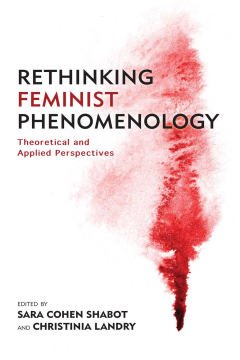
Additional Information
Book Details
Abstract
Although feminist phenomenology is traditionally rooted in philosophy, the issues with which it engages sit at the margins of philosophy and a number of other disciplines within the humanities and social sciences. This interdisciplinarity is emphasised in the present collection. Rethinking Feminist Phenomenology focuses on emerging trends in feminist phenomenology from a range of both established and new scholars. It covers foundational feminist issues in phenomenology, feminist phenomenological methods, and applied phenomenological work in politics, ethics, and on the body. The book is divided into three parts, starting with new methodological approaches to feminist phenomenology and moving on to address popular discourses in feminist phenomenology that explore ethical and political, embodied, and performative perspectives.
This collection not only confirms that feminist phenomenology is still relevant, but does more. The volume puts feminism and phenomenology to work in creative ways, confronting the reader with important unresolved issues uncovered by feminism and offering potential ways to address them by way of phenomenology. The sum is a crucial reflection for our challenging times.
Christine Daigle, Professor of Philosophy, Brock University
Shabot (Univ. of Haifa, Israel) and Landry (Wilfrid Laurier Univ.) have put together an excellent collection of essays by eminent feminist phenomenologists. The book investigates whether the situation of women has actually changed since the 1949 publication of Simone DeBeauvoir’s The Second Sex. The contributors address ways in which change has not been significant enough and offer challenges to the current sociopolitical environment. Composed of three parts that move from the theoretical to the practical, the book provides a glimpse into creative ways to respond to feminist issues. Part 1 focuses on theoretical foundations of feminist phenomenology, part 2 explores ethical and political reverberations, and part 3 addresses practical applications of phenomenology, primarily with respect to embodied being. The work of Husserl, Judith Butler, Beauvoir, and Merleau-Ponty, among others, is brought to bear on issues as far ranging as incarceration, breastfeeding, the fat body, intersectionality, and disability. As with most edited volumes, the quality of the essays varies, but in general they are excellent. The range of topics gives the reader a sense of the breadth of contemporary feminist phenomenology, and for that reason the book is important.
Summing Up: Recommended. Upper-division undergraduates through faculty.
In rethinking the ‘normal’ these essays show how feminist phenomenology is not just still relevant, but is more critical than ever for understanding gendered relations. Addressing contemporary issues such as the #MeToo Movement, the existential damage of school shootings, and experiences of intersectionality, as well as key theoretical questions, the authors define the field.
Helen Fielding, Associate Professor of Philosophy and Women's Studies, Western University Ontario
Shabot and Landry’s collection moves our conception of feminist phenomenology forward in important ways. It takes us from the second sex to becoming-woman, from essentializing to possibilizing, intersubjectivity to intersectionality, the situated woman to the distressed body, oppression to generosity, injustice to moral impartiality, the autonomy of mental faculties to empathetic intimations, murderous flesh to care of and for the body, bounded to carnal intercorporeality, existential damage to feminist self-defense, singular to complex embodiment, and from anonymous individuals to collective spectatorship. These transitions mark the end of the normalized phenomenological subject and the arrival of a new phenomenology founded on gendered and multi-faceted cognition, mobility, sensation, and affective life.
Dorothea E. Olkowski, Professor of Philosophy, University of Colorado
Sara Cohen Shabot is an Assistant Professor in the Women's and Gender Studies Graduate Programme at the University of Haifa, Israel.
Christinia Landry is an Adjunct Professor in Philosophy at Wilfrid Laurier University, Canada.
Table of Contents
| Section Title | Page | Action | Price |
|---|---|---|---|
| Rethinking Feminist Phenomenology | Cover | ||
| Contents | v | ||
| Acknowledgments | vii | ||
| The Water We Swim In: Why Feminist Phenomenology Today? | 1 | ||
| Part I: Foundational Perspectives | 11 | ||
| 1 Subject and Structure in Feminist Phenomenology: Re-reading Beauvoir with Butler | 13 | ||
| 2 Gender Essentialism and Eidetic Inquiry | 33 | ||
| 3 Intersectional Ambiguity and the Phenomenology of | 51 | ||
| 4 Doing Time in a For-Profit Space: Renegotiating Identity in the Prison-Industrial Complex | 69 | ||
| Part II: Ethical and Political Perspectives | 85 | ||
| 5 Toward a Feminist Phenomenological Ethics | 87 | ||
| 6 Phenomenology and Politics: Injustice and Prejudices | 103 | ||
| 7 Hannah Arendt, Gender, and Political Judgment: A Phenomenological Critique | 121 | ||
| 8 Fat Temporality, Crisis Phenomenology, and the Politics of Refusal | 137 | ||
| Part III: Embodied Perspectives | 153 | ||
| 9 Edible Mothers, Edible Others: On Breastfeeding as Ambiguity | 155 | ||
| 10 On the Existential Damage of School Shootings | 171 | ||
| 11 Overturning Feminist Phenomenologies: Disability, Complex Embodiment, Intersectionality, and Film | 187 | ||
| 12 Feminist Visions: Theater and Women Spectators | 209 | ||
| Index | 227 | ||
| About the Contributors | 235 |
